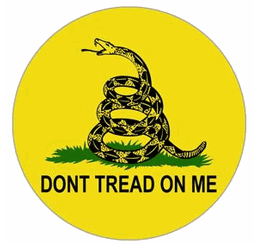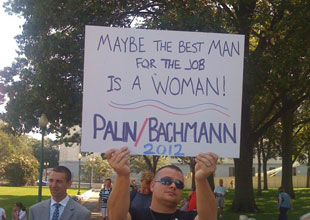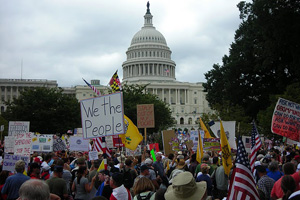One of the stranger elements of the rise of the tea party movement has been its odd mix of politics and money-making schemes. Take the Tea Party Patriots, a national umbrella group that claims to represent more than 15 million activists nationwide. Last week, TPP launched a series of TV ads in Kentucky encouraging voters to put “Tea Party Patriots” signs in their yards before the election. The ads are part of a new push by the TPP to get tea partiers to the polls in November. The group hopes to install 1 million TPP signs on lawns across the country before the election in an effort to “increase the visibility of the tea party movement,” according to a press release.
The timing and placement of the ads and the campaign kickoff is interesting, though, given that Kentucky is also home to Rand Paul, one of the tea party’s biggest stars. Paul is running for the senate as a Republican. TPP is a nonprofit, and as such, it can’t endorse candidates specifically, but it can put generic tea party signs on lawns across the state that might be interpreted as supporting Paul. Sally Oljar, a Tea Party Patriots national coordinator in Seattle, insists that the campaign wasn’t done with Paul in mind. “Our goal is of course to leave no stone unturned in our get out the vote campaign,” she says, but notes that it was “not our inention to affect Paul’s campaign.” Oljar says that the idea for the campaign came from the yard sign company itself and that TPP “decided this would be a good way to raise our profile.”
The sign-maker in question is the Spalding Group, a Kentucky-based firm that bills itself as “the Republican source for web, print and design,” and boasts that it has supplied signs and other paraphenalia (all of it made-in-America) to the past six Republican presidential campaigns. The company was founded by Ted Jackson, a former Reagan administration official who has been involved in Republican politics for 25 years. Spalding hosts TPP’s online store, where tea party activists can load up on various “Don’t tread on me” t-shirts and other TPP merchandise, including yard signs, which run for $8.95 a piece (and include a bumper sticker and political button with each purchase). Spalding paid for the TV ads TPP ran in Kentucky.
The TPP yard-sign marketing effort isn’t the first time that Jackson has run a “million” campaign for a candidate or group. In 2008, he gave away a million “NOBAMA” bumper stickers as part of a plug for Spalding’s online store for John McCain in response to the liberal group MoveOn.org’s pro-Obama bumper sticker giveaway. In 2005, Spalding gave away 1 million bumper stickers for its anti-gay marriage client Alliance for Marriage. Explaining the giveaway, Jackson said at the time, “It is difficult to create a grass-roots movement without materials that allow people to publicly identify with the issue,” a comment that sounds pretty much like what he says about his company’s work with TPP.
As for whether the yard sign effort is a sneaky way to campaign for Rand Paul, Jackson says the reason his firm launched the tea party ads in Kentucky was a simple one: “That’s where we are.” Of course, he recognizes the potential boost the tea party signs might offer to Paul.
“I think if somebody’s putting a tea party sign in their yard that’s very likely a vote for Rand Paul,” he says. Jackson’s firm actually worked for Paul’s opponent, Jackson’s “good friend” Trey Grayson in the GOP primary. But now that Paul is the Repubilcan nominee, Jackson plans to vote for him. Meanwhile, he says, the TPP ads, which only ran for a few days last week, were so successful that his company is planning to expand them to other markets in Florida, Ohio, and California.
Jackson isn’t just helping TPP out of the goodness of his heart (which he acknowledges). He would like the TPP store to corner the market on tea party gear, which is now sold in a host of different places. He thinks tea party activists need a central shopping site online. It’s a potentially lucrative business. If the company’s television advertising succeeds in getting tea partiers to buy a million signs, that translates into $8 or $9 million in business for his company and a nice chunk of change for the Tea Party Patriots, which receives some of the proceeds. (Neither Jackson nor Oljar would divulge what the TPP percentage is on the store sales, but Jackson says “it’s significant.”) The potential fundaising doesn’t quite put TPP in the league of FreedomWorks, the group led by former House Minority Leader Dick Armey and funded by corporate donations, but it’s not bad for a barely year-old group that claims to be a grassroots organization. And who knows? All those yard signs might just help get Rand Paul elected to the U.S. Senate.
You can watch the ads here:














